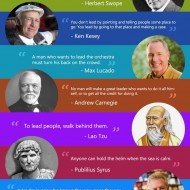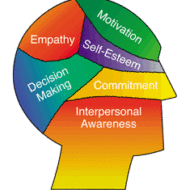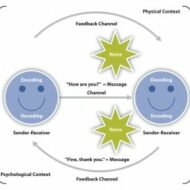Posted by Managementguru in Decision Making, Entrepreneurship, Human Resource, Leadership
on Apr 21st, 2015 | 0 comments

Top Ten Tips for First Time Managers Everybody wants to become a leader. You may vie for it, I might die for it; but in reality not everybody can make a good leader. Leadership does seek persons who are unique in their own way. One unique element which I’ve noticed in managers or leaders is that when they enter the work place, they bring along with them a kind of aura that has the power to make others submissive and polite. Not to say they are over-powering but definitely the sub-ordinates would love to greet their heads with such vigor so as to be in their good books combined with a sense of loyalty laced with respect. This session talks about “First Time Managers” who have reached the position by chance or choice and the etiquettes needed to be bestowed upon that position. 1. Learning is Eternal: “கற்றது கைமண் அளவு, கல்லாதது உலகளவு –This quote by the famous Tamil lady poet Avvaiyar who lived in 13th century reminds you “What you have learned is a mere handful; what you haven’t learned is the size of the world” and exhibited at NASA. It can also be written as “Known is a drop, unknown is an Ocean.” See how appropriate she is in indicating the finer points in our lives- just because you are a team leader or a manager does not mean that you are near perfect. You may be lacking the self-confidence to lead a team or you might be falling short in communicating clearly with the team down the line. It is always better to play along with the team, understand their psychology and at the same time exercise your rights at the right spots. You will stand to gain so much by being flexible and empathetic. 2. Communication is the Key: Here I want to take the help of the ManagementGuru Peter Drucker who prescribed the medicine for better management which is “Management by Objectives.” Keep your team fully informed of project goals, priorities, and all-important deadlines and also involve them to set short term goals. A periodical review of the goals and results would put them in place and make your work easy. Effective communication makes you trust worthy in the eyes of your team, also provides clear direction and a sense of belongingness. 3. Inspire your Team: Passion is one element that is infectious and the other being smile. If you are passionate and sincere in your work, the enthusiasm flows like honey on ice-cream all over the workplace. A good manager creates that “Feel-Good-Factor’ whenever he is around. It is his confidence, emotional stability, communication and determination that gets carried on facilitating effective accomplishment of the enterprise goals. An infographic from AN ETHICAL ISLAND– A great guide for leaders and managers… 4. Be a Friend: Efficient managers understand the pulse of work-force just from their body language and communicating styles. It becomes difficult sometimes to read between the lines when employees are hard nuts to crack and would not explicitly convey or talk about important issues that are bothering them. This may be due to fear, anxiety or peer pressure. These are the times when a manager has to behave like a friend in listening to them patiently to understand the crux of the problem so as to find a suitable solution. 5. Spontaneous appreciation and Mild Criticism: Think about the happiness you derive when somebody appreciates you for a good effort or achievement. The same applies to your team also, right! Appreciation for the sake of appreciating will fetch you only negative results, it has to be spontaneous. Even a mild nod of approval, a...

Posted by Managementguru in How To, Organisational behaviour
on Mar 30th, 2015 | 0 comments

This discussion is centred around an article from WIKIHOW.COM and an infographic from AMERICAN EXPRESS.COM both talking about “Inter Personal Skill Development at workplace via Clear Communication and Body Language.” Inter personal relationship between personnel in workplace has become a serious issue of debate and most of the organizations spend maximum effort and money to make organizational atmosphere bearable devoid of tension and heat. The wikihow article places four important points before us to be considered: Building strong relationshipsDemonstrating ethical behaviorCommunicating clearly andWorking effectively in teams. As Beatrice Vincent rightly puts it “The people with whom you work reflect your own attitude. If you are suspicious, unfriendly and condescending, you will find these unlovely traits echoed all about you. But if you are on your best behavior, you will bring out the best in the persons with whom you are going to spend most of your working hours.” Conflict is the in-thing to be resolved in a work place which is achieved only through motivating the work-force to accomplish some common objectives, that is, the objectives of the organization. How to Develop Interpersonal Skills This infographic stresses the importance of body language like gestures, eye contact, eye rolling, dressing etc. which openly reveals your inner thinking. Explicitly revealing your frutration or unpleasantness over something or someone is definitely not going to help you in getting along with other employees. If your mannerisms do not reflect your self-control, you are in big trouble. Being open and honest may be contextual but being open and rude becomes subjective. 6 Body Language Mistakes to Avoid The most basic of all human needs is the need to understand and be understood. According to Stephen Covey “The Inside-Out approach to personal and interpersonal effectiveness means to start first with self; even more fundamentally, to start with the most inside part of self — with your paradigms, your character, and your motives. The inside-out approach says that private victories precede public victories, that making and keeping promises to ourselves recedes making and keeping promises to others. It says it is futile to put personality ahead of character, to try to improve relationships with others before improving ourselves. So, first understand where you really stand in terms of your EQ or EI (Emotional Intelligence) the vital quality that decides the kind of inter personal relationship you are going to enjoy with your colleagues. Be emphathetic and open minded and never jump to any...

Posted by Managementguru in Business Management, Human Resource, Interview Questions, Principles of Management, Training & Development
on Mar 22nd, 2014 | 0 comments

The Purpose of a Job Interview Interviewing cannot be viewed just as a two way conversation, but as a process of social interaction. Personal interview is the most flexible tool that helps to obtain the most accurate information about the prospective candidate as the presence of the interviewer makes it hard for the respondent to report incorrectly. You might have seen some poker players with a winning spree. That is because of their ability to guess opponent’s potential apart from their own knowledge about the game. The same applies to an effective interviewer who elicits the most appropriate information from the interviewee by gauging his potential and scope. Ambience: The ambience of an interview should facilitate the respondents to freely come out with their ideas about what they expect from the job and also what they are capable of contributing in terms of lifting the organization to greater heights. Fear generally grips freshers who may not have had exposure to such situations that decides their future. Even before completing their engineering or professional courses students get placed in very good companies that offer much scope in terms of pay and career advancement. It has become statutory for these students to express themselves in the most impressive manner to capture the interest of the interviewers and to outsmart their rivals competing for the same position or capacity. Body Language: Your body language speaks volumes about the self confidence you possess, whether you are really capable of leading. Pleasing personality is definitely a plus and it is a winning strategy to get noticed among the pool of prospects. Try to be as modest and dignified in your behavior and attitude but at the same time be self assured to avoid any question that falls beyond the scope of discussion or if it is aimed to puncture your ego. Stress Interviews: Most of the stress interviews are structured in order to test the tolerance level of the prospective employees given a crisis situation and also to judge their decision making skills in such a situation. Rapid fire questions are thrown before you, wherein either you can buy some time to think, keep quiet to prove your self control or burst open and check out. Higher level management interviews are of this order as managers of the senior levels and CEO’s are constantly exposed to pressure situations and they need to keep their think tank cool to keep going. Systematic interviewing using lucid language is welcome. The session must be to the point and the respondent should not lose interest in the interview. Emotional and leading questions better be avoided. The interviewer must be a trained man who has the ability to conduct the interview in the most natural way and also should be well informed about all the possible and important aspects about the prospective candidates. Hypothetical Questions: Recent trend is to ask hypothetical questions where the respondent has to place himself in a particular situation and arrive at solutions. This probes beyond the skill sets that the respondent possesses and it concentrates on the crisis management ability, presence of mind and the quick wit of individuals. Corporate companies conduct their interviews in a completely different manner. They are more concerned about the attitude, morale, soft skills, role analysis and the like. How an individual performs as a member of a team or a group and how well he can lead his team in times of crisis are a matter of concern in big corporates. Say for instance, if you are the head of a company, what possible changes would you bring in terms of sales, marketing and production? What will be...

Posted by Managementguru in Human Resource, Motivation, Organisational behaviour, Principles of Management, Training & Development
on Mar 18th, 2014 | 0 comments

Promoting Effective Communication in the Work Place A purpose or an idea to be conveyed is needed for communication to happen. The question is how well or how successful you are in transmitting the message (mind you! without transforming it) to the receiver in the proposed meaning, whatever the channel might be! Communication must serve the following functions… Effective Control Motivational expression Information Fundamentally communication helps in controlling the behavior of the members of an organization in several ways. Either formal or informal, it controls the activities of the employees by prescribing certain procedures of communication to be followed when there is a grievance or a difficulty regarding his/her job, the work situation etc. Communication provides Vital Information: Communication also motivates people by clarifying what needs to be done, how to be done and how they are performing and what can be done to improve their performance. Most important function is that communication provides vital information that is crucial for members at all spans or levels to make effective decisions. The feelings of members are also articulated as grapevine in an organization, and in a way it serves as an outlet for their emotional expression. Grapevines: Grapevines are always not harmful, they might even give you information about the pulse of people working for you and if you are really sharp, “you can work it out to your advantage. Communication is always referred to as “oxygen”, we can feel only when it breaks down. Communication plays an important role in managerial and organizational effectiveness. Nevertheless, on the other side it can be the root cause of all the problems in your organization. This excellent infographic on Business Etiquette and Body Language Blunders clearly indicates how body language and gestures influence communication to a greater level. Source: www.thewebsitegroup.uk Effective Communication: In general, effective communication is the prerequisite for any healthy organization and the attainment of its standard objectives. Most of us are in fact aware of how our vocabulary has been modified to reflect political correctness. For instance we have replaced certain words like handicapped, blind and elderly by physically challenged, visually impaired and senior. One must be sensitive to others feelings. Words are the primary means by which people communicate; so due importance must be given for politically correct words both in the society at a larger level and in firms at the micro level. Increasingly, I find people like being addressed by their designation capacities. Even people might get offended if you call them by their first names as it is regarded to be disrespectful. But I think it is always better to address a person giving due respect to his position if you are reporting to him. That way there is no scope for conflicts and strained relationships. Western countries are more modern in their outlook and have a broader perspective on human interactions than the east. Gestures: Words mean different things to different people. In organizations, people of different background work together, so they have their own language of expressing their opinions and ideas. So it calls for a uniformity of language that is well understood and appreciated by all. Gestures also play their part in communicating ideas. So self controlled expressions, proper behavior are also necessary that completes a communication process. Ultimately proper communication leads to… Satisfied employees Effective feedback Organisational efficiency Freedom for suggesting ideas Enhanced interpersonal relationships Closely knit organisational network Encouraging trust and openness. Communication is an on-going process and the purpose is “not to dictate but to make the employees understand the big picture” as to how the process imparts success and viability to the...








